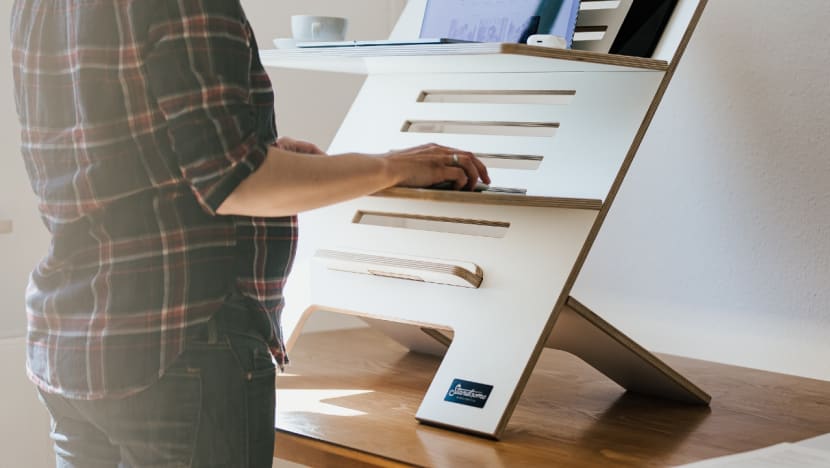Majority of firms to keep hybrid work approach, as SNEF advises against reverting to pre-pandemic arrangements

SINGAPORE — Most companies prefer to stick to hybrid work arrangements because it allows employees greater flexibility and would be good for their well-being, employers interviewed by TODAY said.
Out of the 10 firms approached on Tuesday (April 26), six said that they would retain their present hybrid work arrangements, while one said that its employees would continue with remote work completely, even though Covid-19 regulations on this have eased.
The remaining three firms have plans to get workers to fully return to the office. Two of them said that the nature of their industries, which are in education and logistics, does not allow employees to work remotely.
Most of the 10 firms interviewed are also planning on maintaining the same frequency of work-from-office days a week.
Mr Suhaimi Salleh, chief executive officer of training consultancy SSA Group, said that he plans to retain the company's existing 50 per cent capacity for its work-from-office arrangement.
"Our long-term plan is to introduce a hybrid work arrangement, with most office staff working from home at least 50 per cent of the time.
“Those who need to interact with our clients in person regularly may have to work from office 100 per cent. Some staff members are already working fully from office because of work necessities."
Mr Suhaimi said that the hybrid work arrangement would allow employees to "achieve better work-life balance".
"They can attend to their personal needs, as and when necessary. However, there can also be abuses that, if not managed properly, may affect the overall work culture of the organisation."
A study conducted by the Institute of Policy Study, which collected views from more than 2,000 citizens and permanent residents here aged 21 and above, revealed that the proportion of people who prefer to work from home on most days has dipped as Singapore moves towards living with Covid-19.
However, the study, which was published on Monday, also found that attitudes among this shrinking group are hardening, with nearly half saying that they would consider quitting their jobs if they were forced to return to the office.
To meet the diverse needs of employees, employers would need to implement flexible work arrangements.
In response to TODAY's queries about the results of the survey, Mr Sim Gim Guan, executive director at Singapore National Employers Federation, said the findings indicate that there "is no one-size-fits-all approach to work arrangements".
"Apart from there being different work settings, the work-life needs of employees would also change over time. To meet the diverse needs of employees, employers would need to implement flexible work arrangements."
Mr Sim advised companies against reverting to pre-pandemic work arrangements but neither should they retain work arrangements introduced when employees could not return to the workplace during infection waves.
He said: "Besides working from home, employers have to assess and implement flexible work arrangements that suit their business and meet the needs of employees, including for those who can neither telecommute nor work from home.
"They can build on the work-from-home arrangement and introduce other types of flexible work arrangements such as staggered working hours and part-time work to cater to the different needs of employees."
Some employers have indeed started finding new ways to cater to the needs of workers.
Ms Lee Yan Hong, head of group human resources at DBS bank, said in an email interview that on top of retaining its policy of allowing employees to work from home 40 per cent of the time, which was introduced in February last year, the firm has introduced new initiatives such as “Focus Friday Afternoons”.
This is when Friday afternoons are kept free from internal calls or meetings.
“This is our conscious effort as an organisation to ensure that our employees have a few hours of protected time for focused work, learning or even quiet reflection before transiting to the weekend," Ms Lee said.
Others have shifted to let employees work completely from home because they believe that it promotes productivity and helps to cut costs for the business.
Mr Andrew Tan, 48, chief executive officer and co-founder of Pee-Ka-Poo Diapers, a small- and medium-sized enterprise here, has adopted this approach since June 2020, and has since hired staff members based overseas in countries such as Malaysia and the Philippines.
"Last time, the company was fully office-based with 15 staff but after the lessons from Covid-19, we saw the benefits of working remotely. Working around an ecosystem of service providers is actually more efficient."
The preferred choice is to have the hybrid format because the flexibility will be more beneficial to me as a parent.
Among the three companies that will have employees fully return to the office was real estate group City Developments Limited.
It said that personnel working together in the office allows them to nurture "stronger teamwork, enhanced productivity and talent development" and gives new employees the opportunity to gain effective mentorship and knowledge transfer.
"Even as we prepare for a full return to the office, the pandemic has taught us the important lessons on flexibility and adaptability in work arrangements, and we will continue to embrace this spirit.
"We recognise that being flexible and nimble in our work arrangements also supports business continuity and organisational resilience."
WHAT WORKERS SAY
New employees who spoke to TODAY said that working from the office would give them more opportunities to learn more about the company and job.
Mr Joshua Fang, 25, who is an associate recruitment consultant, said: "As a fresh graduate and new hire, it would be difficult for me to be exposed to the full company culture without having direct interactions with my colleagues. Also, being in the office provides peer support, which motivates me to work harder."
Some other employees were more resistant to returning to the office, saying that it gives them less time to spend with their family and run errands.
One of them was a 39-year-old senior manager, who declined to be named. He said that his company, a multinational cooperation based in Singapore, has started shifting away from hybrid work arrangements and will soon revert to a work-from-office regime.
"The preferred choice is to have the hybrid format because the flexibility will be more beneficial to me as a parent. I don't have to rush in the morning and evening to take my one-year-old to and from the infant-care centre.
"Most of the other departments are going back to the office full-time with effect from today. No word from management yet but we are expected to follow suit in the coming weeks."















